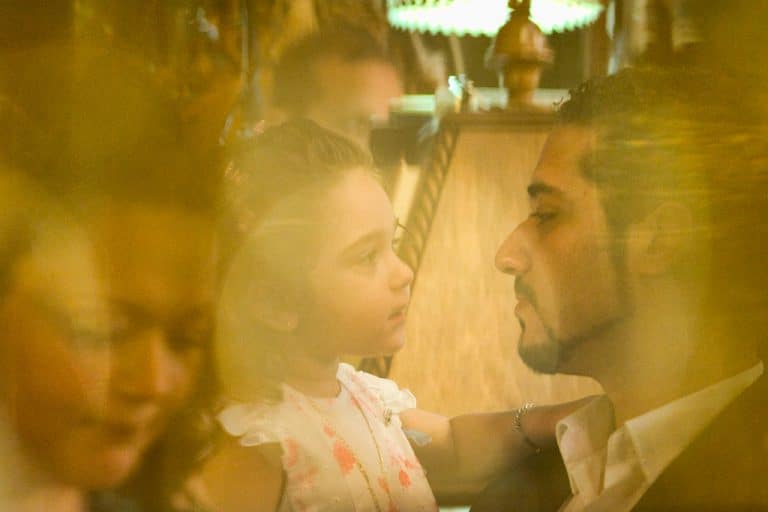
Image by Laura D'Alessandro/Flickr, Attribution.
Living Through Death: Love at the End of Marriage
The sound drifts over to our bedroom like clockwork. Every night the piano plays a jaunty tune next door. It is usually the piano’s keys dancing in turn, but sometimes it is a record from the ’50s, a swaying, big-band sort of music that somehow brings our little corner of the neighborhood back several decades to when these homes were built, and a marriage was just beginning. Time rewinds and restarts with each change in key.
I stop and sit each time, pulled to the window. I pause to listen and imagine the scene as the music sweeps into each corner of their home — over the graying couch in the sitting room, over the mounted family photos, over the beautiful open Bible on a wooden stand. Our elderly neighbor plays faithfully, the notes an affirmation of presence, a victory of joy, a connection maintained.
Our neighbors have been married for over 50 years. The husband attended our alma mater, Dartmouth College, where my husband and I met. When we moved into our home, the one we are raising our babies in as we sweep into our mid thirties, our neighbor, my husband, and I traded stories of young lives in rural New Hampshire experienced five decades apart. It is impossible to not see some mirror of one another, an inversion of life stages just next door. Time has a funny way of crossing your path with those you need to meet, with those that have something to teach you.
Our neighbors raised five children together, and have grieved the loss of an adult child. Rather than sink into their grief, they remained aloft, holding on to one another like defiant petals in the wind. The creases in their eyes remember, but don’t tell. Their hands are soft and worn with time; their soft bodies such a contrast from the small and fast bodies of the children I hug and care for each day, the babies that give my days rhythm and purpose. I feed, I bathe, I sing, and I comfort. So does my neighbor. He and I spend our days caring and loving, and preparing different goodbyes: My children are growing, changing, preparing for adulthood, when they will leave me and begin to craft lives of their own. Every day they are close to my chest they are also a day closer to leaving, to letting go. I will mourn this, but it is the way of life. My neighbor’s wife is changing, and preparing to leave him as well. With much grace and kindness, he is loving her through what remains, tending to her body as it gives in and gives way, preparing a gentle path for her death. This too is the circle of being, but a way of knowing and understanding that I have not experienced yet, that I can only hope to live up to if put to the test.
I watched her body deteriorate from the window or my doorstep, in short visits and morning hellos. I saw the energy present just a few short years ago fade a little — in the crook of a missed step, in a word forgotten, and then nearly lost entirely, eyes adrift. She is present in vibrant sparks and spurts, usually when my children come by — there is something about a small child that awakens something in a mother. Nevertheless, I have watched her fade from the world bit by bit, remaining in it but not quite of it.
Except for when she is with him.
When she is with her husband, she is here. After more decades together than not, and as her mind and body slowly erode, it is clear that her husband is the axis upon which things can still make sense for her, the security she needs to navigate this final gray space between life and death. I see the sparkle in his eye when he looks at her still, and it is both heartbreaking and inspiring. There is no measuring, no holding back, no keeping score or negotiating there. There is no use for pretense at this place in the journey, and he is all here, all in, with her.
It is rare to see the promises of love lived out fully, to watch people supported by family and friends in late life in such a way that such may be realized. It takes a village to raise a child, and it takes a village to guide someone to their end: I see their daughters come by, their grandson mowing their lawn every week, a local nun’s order helping with adult care. I grapple very much with the idea of God in this broken world, with the idea of a divine something that I cannot quite grasp or logically explain — but if such a thing exists, the devotion I see in my neighbors would embody and affirm it. His simultaneous acceptance of letting the love of his life go, and his commitment to being there and loving her through it, of bearing witness and being a part of a process that must be immensely difficult in its labor and finality, is the stuff of legend. Getting married is easy. Loving anyone this way, for this long, is hard and messy, miraculous and graceful. Accepting and facing death, stopping treatments when it is evident they are of no further use, choosing to live what is left simply rather than prolong, is quietly courageous and brave in a culture ill at ease with death and dying, uncomfortable with what it all looks like. There is no glamor in the smells and textures of death, in gradual decline. But it is here where life is at its most palpable, its most raw, its most layered.
As often as I can, I stop in and visit, and bring over a treat or a reminder that we are here should they need anything, anything at all. I have been told that I am a kind neighbor, and that this is very nice of me. I reject this. The truth is I am the lucky one to have been privileged enough to witness both the simplicity and intricate nuance that is enduring love, to see firsthand what end-of-life care is and means, to consider that each day of marriage is a step on a very long walk, a walk that must end as all do.
Their melody plays in my head each night, making me pause amid the frenzy of laundry and toddler bedtime and remember that it all comes full circle. We are all in some way preparing for endings. Some day the music will stop next door, and everything will change. But for now, the music keeps playing. Life is being lived, completely and honestly. I will keep listening. I will keep remembering that the most extraordinary lives are often the ones lived most quietly, most remarkably, by one’s neighbors and loved ones, if we just pay attention. If you just listen, everyone has a song.

Share your reflection